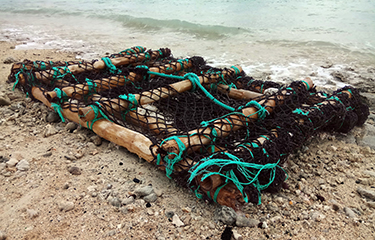Members of the Indian Ocean Tuna Commission (IOTC) have, for the second time in under a year, failed to agree on a resolution for the outcome of a secret ballot vote on proposed amendments to regulations on the management of fish aggregating devices (FADs).
During a special meeting on 29 November, efforts to strike a deal on the disputed June 2021 vote on amendments to Resolution 19/02 – supported by Kenya, Sri Lanka, Maldives, Mozambique, Pakistan, Somalia, South Africa, Indonesia, and Tanzania – flopped, despite several non-governmental organizations calling for a quick resolution of the dispute.
If they had been adopted, the amendments would have strengthened the resolution to mitigate “the ecological impacts associated with drifting FADs, especially its stranding, damage to coral reefs, and inshore habitats, and [their] contribution to marine debris.”
“We are disappointed that IOTC could not agree on revisions to improve its FAD-management resolution this year, delaying progress on this critical issue until the 2022 commission meeting,” International Seafood Sustainability Foundation (ISSF) President Susan Jackson said in a press release.
ISSF has called for a more proactive approach in the push to prioritize voting procedures as a tool for the regional fishery management organization (RFMO) decision-making process, and also encouraged IOTC members “to engage in collaborative discussions in the lead-up to the 2022 annual meeting.”
“Only through such ongoing communication can IOTC reach an agreement to strengthen FAD management that will be supported and effectively implemented by all parties,” Jackson said.
Adopting the amended resolution would give impetus to the 2017 IOTC Scientific Committee report proposing FAD ownership become part of the mandatory information to be collected by the IOTC for easy modeling and reporting of the tracking status of all FADs.
The IOTC and other tuna RFMOs have adopted resolutions promoting the reduction of synthetic marine debris by using natural or biodegradable materials for drifting FADs. The failed proposal would also have strengthened the IOTC’s addressing of this issue.
Photo courtesy of RaroLens2/Shutterstock







